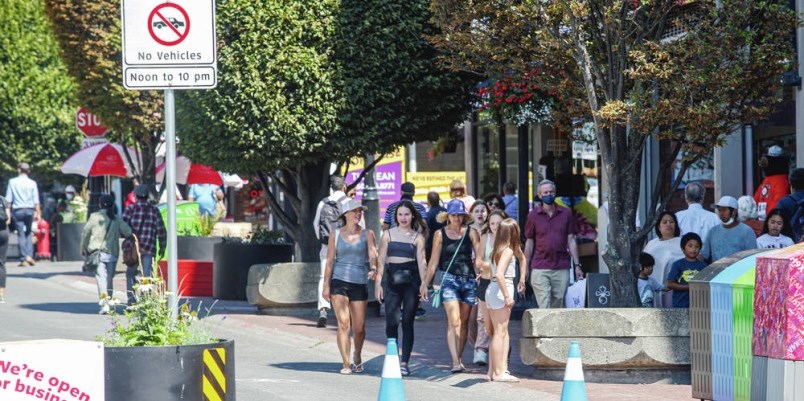Hotels were at capacity, restaurants and bars were overflowing and tourism operators saw encouraging numbers.
The August long weekend was “crazy” on Vancouver Island — in some places even better than pre-COVID — as pent-up demand for travel spilled in from the mainland, aided in large part by the wildfires and smoke blanketing most of the province.
Many of those rushing to the Island had originally planned to vacation in hotspots like the Okanagan and Kootenays, where Environment Canada has issued air-quality warnings and evacuation alerts could happen at any moment.
Favourable winds have kept smoke away from the Island, which has no major fires, attracting visitors from elsewhere in B.C. and other provinces alike.
“The number of places people can go has just shrunk — and we’re really seeing that demand here,” said Bill Lewis, general manager of the Magnolia Hotel in downtown Victoria.
Accommodations in Tofino and Ucluelet were booked solid, mountain bikers invaded Cumberland and the Comox Valley, hikers packed the trails and parks, and restaurants and pubs up and down the Island saw lineups, and posted signs asking for patience. Licence plates from every province have been spotted throughout the Island.
A BC Ferries spokeswoman said from Friday to Monday, the major routes between Vancouver Island and the Lower Mainland carried more vehicles than the same period in pre-pandemic 2019. Sailings Monday were sold out.
At the Malahat Skywalk, the Island’s newest attraction, 4,000 visitors walked the spiral walkway to the top on Sunday — far more than general manager Ken Bailey had expected. “There were lots of people from the Lower Mainland here,” he said. “But also a lot of people from the Island who decided to stay on the Island.”
The increasing tourism traffic comes with challenges, says Anthony Everett, chief executive of the Vancouver Island Tourism Association. He said most hotels, restaurants and other operators are still recovering from the pandemic and are understaffed.
“People are coming whether they have a booking or not,” Everett said. “Being busy is great, but it leads to challenges.”
And it could get even busier when the province opens to fully vaccinated Americans this Monday.
“Travelling with patience now is really important,” said Everett. “I’m hearing that people are finding ad-hoc places to stay. The hotels are full, campsites are full.
“The crisis is labour.”
Everett said only about 20% of tourism businesses are operating with full labour pools, leaving the majority still grappling with new hires to meet demand.
Ian Tostenson, chief executive of the B.C. Restaurant and Food Services Association, said the industry has lost 45,000 workers since the start of the pandemic. It needs about 190,000 to operate efficiently. That’s “an all-time low” for the industry in B.C., he said, noting the shortages are most severe in Victoria, Vancouver and Kelowna.
“We aren’t getting those people back … they’re gone,” said Tostenson. “I talk to restaurant owners who say they put out ads and nobody answers. The people who left are still on federal wage subsidies or are finding the industry isn’t dependable and they’ve left for tech jobs or food delivery or other work.”
Tostenson said restaurants and pubs are compensating for short staffing by altering hours, simplifying menus and closing off some seating areas. Some owners are working seven days a week, 18 hours a day.
Tofino Mayor Dan Law said the community’s tourism businesses are running at maximum capacity. “I can say with confidence that Tofino is 100% booked … reservations are a must,” he said Tuesday.”
Law said several businesses had a “record weekend,” but noted many restaurants are understaffed, closing early or simply running out of supplies.
“There’s a growing number of stories from local restaurateurs and servers that people are becoming very unhappy if they can’t be served in a timely matter or get a table,” said Law. “We love visitors here. We want to give people the best experience possible, but businesses are stretched.”
At the Magnolia Hotel, all 64 rooms have been booked since the weekend, but Lewis said he may take some rooms out of service and reduce capacity “just to balance things out” so his limited staff “can catch their breath.”
In a tight labour pool, he said, retaining staff has become a priority.
Law said restaurant owners and accommodation suppliers in Tofino have also told him the pressures on staff are mounting “and they can see the burnout … we’re asking people to be kind, have patience.”
At Prince of Whale Whale Watching, the company had 10 of its 15 vessels operating over the long weekend as demand soared from B.C. residents and Albertans, as well as a growing number from Ontario.
Company spokesman Ian Macphee said although the rest of the summer looks bright, the company will still be down by 60% compared to pre-pandemic summers. “There’s just not enough summer left … you can’t catch up.”
Meanwhile, downtown Kelowna has been eerily quiet, with small numbers of people venturing out as thick smoke covers the city. SunWave Boat Rentals, a major tourism operator, reported a 50 per cent drop in customers since the smoke arrived.
A COVID-19 outbreak in the Okanagan also saw several bars and restaurants closing their doors through the long weekend.
With a file from Vancouver is Awesome



